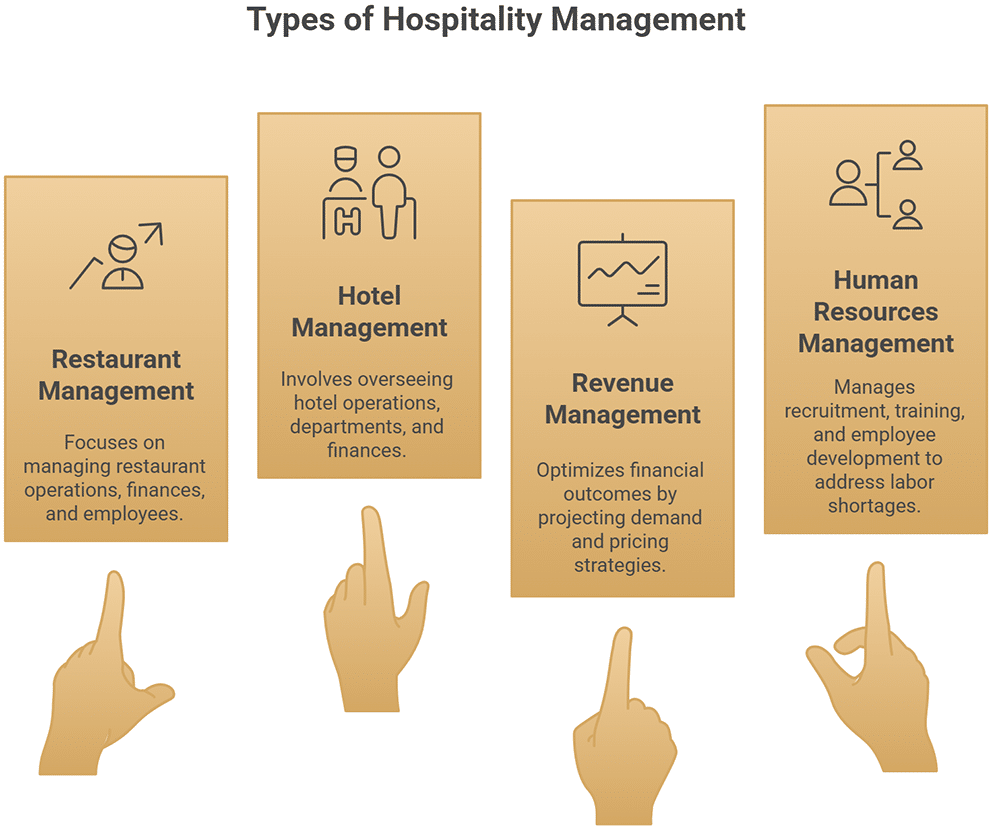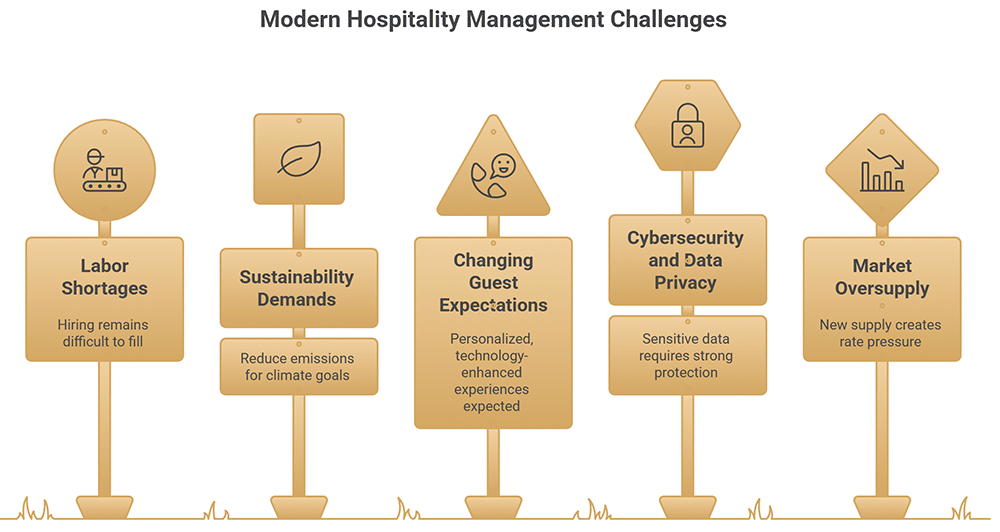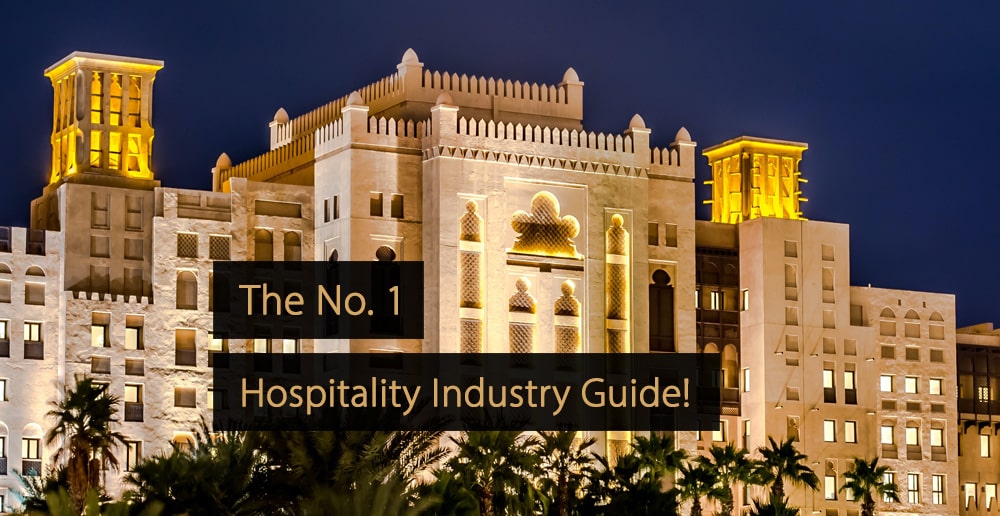Hospitality management has various objectives and functions that differ from one business to the next. However, its primary goal remains the same; to provide customers the best service and a flawless experience from start to finish. If you are interested in a career in hospitality management, you will learn all about this industry and how to get started in this article.
Table of Contents:
- What is Hospitality Management?
- What is the Difference Between Hotel and Hospitality Management?
- Why Hospitality Management Is Important?
- What Qualifications Do You Need for Hospitality Management?
- What Are the Main Responsibilities of a Hospitality Manager?
- Guest Relations & Satisfaction Control Within Hospitality Management
- What Kind of Jobs Can You Get With a Hospitality Management Degree?
- Hospitality Management Operations
- Different Management Types Within the Hospitality Sector
- Popular Hotel Brands and Their Management Approaches
- Hospitality Management Challenges and How to Overcome Them
- Hospitality Management and Other Hospitality Careers
- Find Hospitality Management Career Tips & Opportunities
- Hotel Websites for Finding Hospitality Management Jobs
- Global Outlook of Hospitality Management (2026–2036)
What Is Hospitality Management?
Firstly, it’s important to know what hospitality management is all about. It oversees the daily administrative, operational, and commercial tasks of hotels, resorts, restaurants, catering establishments, shops, casinos, amusement parks, and many other related businesses.
From the big hotel chains to the smallest dining establishments, they are all part of the hospitality industry. When you work in hospitality management, your goal as the manager is to make your guests feel at home and ensure they have the most pleasant experience at your establishment.
Video: What Is Hospitality Management?
What Is the Difference Between Hotel and Hospitality Management?
Hospitality management can sometimes be confused with hotel management, mainly because they share similar academic requirements and are both part of the travel and tourism industry. However, there are some prime differences between the two sectors.
Hotel management focuses on the hotel industry, and the job opportunities are only within the hotel sector, with managerial jobs in hotels, housekeeping, and operations management. On the other hand, hospitality management is an umbrella of different industries, including food and beverage, travel, accommodation, event management, etc. There are varied managerial job opportunities in this sector, such as a casino manager, resort manager, restaurant manager, or event organizer.
Why Hospitality Management Is Important?
The economic importance of effective hospitality management cannot be overstated. Globally, Travel & Tourism’s rebound means hotels are again major engines of GDP, employment, and tax revenue. According to Mordor Intelligence, the US hospitality market alone stands at $247.45 billion by 2030 at a CAGR of 4.87%. The industry employment impact is also impressive. The World Travel and Tourism Council predicts that by 2034, the sector will employ 449 million people worldwide, which represents 12.2% of the workforce, as noted in EHL’s hospitality statistics report.
Modern hospitality management relies heavily on sophisticated metrics to measure and improve guest satisfaction. Properties now track Net Promoter Score (NPS), Customer Satisfaction Scores (CSAT, and online review ratings across multiple platforms. These metrics directly correlate with financial performance, as satisfied guests generate higher revenue through repeat visits and positive word-of-mouth marketing.
Effective hospitality management ensures long-term business sustainability through strategic planning, risk management, and adaptation to market changes.
Hilton CEO Christopher Nassetta noted on an earnings call,
“In more uncertain times, they really want to do conversions with us because they want the safety and comfort of being in a system like ours that has hundreds of millions of loyalty members and drives such strong commercial performance.”
What Qualifications Do You Need for Hospitality Management?
While some hospitality jobs only require a diploma, earning a higher salary in a higher-level job is best achieved by getting a degree. An associate’s degree offers general education courses with some hospitality subjects covered in the classes. A bachelor’s degree, on the other hand, will take 4 years to complete and covers hospitality management, accounting, and finance courses. Most business colleges offer hospitality management courses as part of their curriculum.
What Are the Main Responsibilities of a Hospitality Manager?
As a hospitality manager, your task is to oversee various departments in your resort or hotel, for example, housekeeping, concierge, restaurant, spa, budgeting, conferences, reception, maintenance, and guest services. It is your job to ensure everything runs smoothly in all the departments. Although your duties will depend on which sector you work in, some of your main responsibilities can include the following:
- Monitoring accounts and managing budgets
- Managing staff and arranging cover for holidays and absences
- Assist the staff with the day-to-day running of events and functions
- Come up with new and innovative ideas for better business performance
- Dealing with customer complaints and queries
- Interview and train new staff
- Ensure health and safety regulations are adhered to
Guest Relations & Satisfaction Control Within Hospitality Management
For those involved with hospitality management, guest relations and guest satisfaction are essential issues. The following sections explore how businesses in the hospitality industry can control these areas.
Creating Memorable Experiences
One of the best ways for hospitality industry businesses to control guest satisfaction is through the creation of memorable experiences. From small restaurants to large hotels, businesses can always strive to make the guest experience feel more special through personalization, unique offerings, and excellent customer service.
Anyone working in hospitality management must constantly strive for ways to make their business stand out from rivals. Try to offer something special, no matter how small or large your business is. Guests remember unique offerings, quality food, great attention to detail in hotels, or small adjustments being made to improve comfort and enjoyment. Their retelling of these memories can ultimately help you build a more positive reputation.
Communication and Interpersonal Skills
Among the most important skills for those in hospitality management and other customer-facing roles are communication and interpersonal skills. Businesses in the hospitality industry should prioritize written and verbal communication skills when recruiting staff and should place a strong emphasis on effective communication within training, too. It is essential in the modern world for digital communication to be as strong as in-person communication.
Staff should be polite, use positive body language, and stay patient when dealing with customers. Always adopt a friendly tone and take time to make customers feel at ease. Good communication skills also include the ability to de-escalate conflicts, while taking issues and complaints seriously. Guest satisfaction can be badly affected if they ever feel they are not being listened to or that their legitimate grievances are being overlooked.
Addressing Customer Needs and Expectations
A fundamental part of good guest relations within hospitality management is addressing the needs of your customers and ensuring you not only meet their expectations but exceed them. Any business in the hospitality industry can get good at addressing needs and exceeding expectations, but it does require the right steps to be taken.
For instance, it is important to seek feedback and to take the feedback you receive on board. You need to try to build a team of attentive staff who notice the small details. If you can anticipate needs before they arise, customers will appreciate and remember it. Go above and beyond to make each visit pleasant and personalized in some way.
Table: Importance of Cultural Competence in Hospitality Management
What Kind of Jobs Can You Get With a Hospitality Management Degree?
Since hospitality management covers many different sectors, the job opportunities are aplenty. Below are some examples of the hospitality careers you can pursue after getting a degree in this field:
- Resort or hotel manager
- Restaurant manager
- Food & Beverage Manager
- Catering manager
- Event planning
- Chef
- Concierge
- Marketing, sales, and media roles
- Financial or accounting roles
Video: More Information About Hospitality Management
The video below explains what hospitality management is and how to choose the right university.
Hospitality Management Operations
Hospitality management operations involve implementing resources, materials, equipment, and technology. As an operations manager, you will be expected to develop and deliver services or goods to customers based on their needs. In operations management, your role is to handle different strategic problems, including the utilization of project management methods, determining the size of manufacturing plants, and implementing the IT network structure. Other operational responsibilities include inventory levels management, raw material acquisition, materials handling, quality control, and work-in-process levels.
Different Management Types Within the Hospitality Sector
There are several different types of hospitality management to be aware of, with two of the most significant types explained in more depth below:
1. Restaurant Management
Within the wider field of hospitality management, the discipline of restaurant management describes the management of businesses within the restaurant industry or the management of restaurants within a larger business. This includes managing day-to-day operations, employees, finances, business strategies, stock, etc.
Check out “Restaurant Management: Everything You Need to Know” to explore the topic of restaurant management in greater depth and learn about what it means, the main duties, why it matters as a discipline, and the specific qualities needed to achieve success as a restaurant manager.
2. Hotel Management
Hotel management is a type of hospitality management specifically focused on managing a hotel, motel, hostel, bed, breakfast, or similar form of guest accommodation. This means overseeing core operations, supervising departments in need, managing employees and finances, and devising strategies.
If you would like to know more about what hotel management entails, how to acquire a hotel management position, some of the most critical hotel management software solutions, and the various strategies that are used by professionals working in this area, check out “Hotel Management: Everything You Need to Know About Managing a Hotel”.
3. Revenue Management
Revenue management is a discipline within hospitality management that is focused on optimizing financial outcomes and, in particular, revenue generation. This involves using available data to make intelligent projections about demand so that the right product can be sold to the right customer, at the right time, for the right price.
To learn more about revenue management, how it can be defined, why it is important, and how it differs from similar concepts, check out the “Revenue Management; Clearly Explained!” article.
4. Human Resources Management
HR oversees recruitment, onboarding, payroll, and employee development. However, persistent labor shortages challenge hotels to maintain standards. The AHLA report notes staffing remains below pre-pandemic levels, with 79% unable to fill open positions despite 86% of respondents having increased wages over the last six months, intensifying wage pressures. Training programs, cross-departmental learning, and employee wellness initiatives improve engagement. Recognizing service excellence and offering career growth opportunities helps reduce turnover and sustain consistent guest experiences across all hotel departments.
Popular Hotel Brands and Their Management Approaches
Marriott International
Marriott International continues to lead the industry with aggressive growth strategies. In Q2 2025, Marriott reported 9,600+ properties and 1.74M rooms, a record pipeline of about 590k rooms, and nearly 248M Bonvoy members. The company’s leadership projected around 6% net room growth, supported by key strategic moves such as acquiring citizenM, a lifestyle hotel brand, and launching Series by Marriott, a new mid-to-upscale collection brand designed for conversions.
Marriott CEO Anthony Capuano outlined his vision to transform the company from a traditional hotel group into an all-encompassing travel enterprise. He stated in an exclusive Skift interview:
“We want 100% of your travel wallet, with the company achieving record growth, including 6.8% net rooms growth on what was already the industry’s largest portfolio.”
InterContinental Hotels Group (IHG)
IHG operates with an asset-light, fee-based model that grows quickly through franchising, conversions, and selective new builds. By February 2025, IHG had 6,600+ hotels in 100+ countries and a pipeline of 2,200+ hotels, with 40%+ already under construction. IHG also leads on sustainability initiatives. The brand has set a target to reduce carbon dioxide emissions by 46% by 2030, according to Sustainability Magazine.
As IHG CEO Elie Maalouf states:
“We are excited to launch our Low Carbon Pioneers program as another innovative way in which we are meeting evolving guest expectations. It will help hotel owners future-proof their businesses and reduce carbon across our estate.”
Hospitality Management Challenges and How to Overcome Them
The hospitality industry confronts multiple interconnected challenges that require innovative solutions to maintain service excellence while improving sustainability, profitability, and growth.
1. Labor Shortages
The industry’s most pressing challenge remains workforce availability. According to a Hireolgoy survey, about 91% of hospitality leaders report that hiring remains difficult, with housekeepers being the hardest role to fill.
According to CiHMS analysis, 65% of surveyed hotels report staffing shortages as of early 2025, with 71% of hotels having job openings they cannot fill despite active recruitment efforts. On average, hotels are trying to fill 6-7 open positions per property.
Hotels can attract and retain staff by offering fair schedules, training programs, and growth opportunities. Cross-training employees improves flexibility, while technology such as mobile check-in reduces workloads. Recognition programs and wellness initiatives can improve morale and reduce turnover across departments.
2. Sustainability Demands
Environmental sustainability has become non-negotiable for modern hospitality businesses. According to the Sustainable Hospitality Alliance’s Global Hotel Decarbonization Report, the sector must reduce its emissions by two-thirds by 2030 and 90% per room by 2050 to contribute to the goals set out in the Paris Climate Agreement. Consumer expectations reinforce these demands.
A Booking.com survey found that 83% of global respondents believe more sustainable travel is important.
Hotels should integrate energy-saving systems, water-efficient fixtures, and food-waste reduction programs into daily operations. Partnering with local suppliers and publishing clear sustainability reports can strengthen brand trust.
3. Changing Guest Expectations
Modern guests expect personalized, technology-enhanced experiences while maintaining authentic human connections. A J.D. Power study found that guests who used a hotel’s mobile app were 68 points more satisfied on a 1,000-point scale. Mobile check-in, digital keys, and personalized offers are now standard expectations.
Hotels can improve guest satisfaction by investing in mobile technology, pre-arrival messaging, and in-room automation. Data analytics should be used to personalize offers and anticipate needs. Staff should be trained to complement digital tools with warm, human interaction.
4. Cybersecurity and Data Privacy
Hotels are prime targets for cyberattacks because they handle sensitive guest and payment data. New security standards, such as PCI DSS 4.0, have made compliance more complex. Unsecured systems or third-party vendors can lead to data breaches and reputational damage.
Hotels should strengthen cybersecurity through data encryption, multi-factor authentication, and staff training. Regular security audits and network segmentation help prevent unauthorized access. Establishing clear incident response plans ensures quick recovery if a data breach occurs.
5. Market Oversupply and New Supply Pressure
According to AHLA, the US hotel pipeline included about 157,000 rooms under construction. While growth signals optimism, in some markets this could create oversupply, leading to lower rates and weaker performance for existing properties.
Hotels should carefully study market data before expanding or renovating. Converting existing properties instead of new builds can save costs and reduce risk. Operators can differentiate through local experiences, improved loyalty programs, and flexible space usage to stay competitive in saturated markets.
Global Outlook of Hospitality Management (2026–2036)
Travel and hospitality should grow steadily through the next decade, powered by rising middle classes, air-capacity growth, and technology-enabled productivity. WTTC projects the Travel and Tourism market could reach $16-16.5 trillion (about 11-11.5% of global GDP) by the early-to-mid 2030s while adding tens of millions of jobs as the sector outgrows the wider economy.
International arrivals are set to keep increasing. UN Tourism’s long-run baseline points to about 1.8 billion international tourists by 2030, with emerging markets capturing a larger share of growth. Air travel is the demand backbone. IATA expects passenger journeys to more than double from 2019 to about 7.8 billion by 2040. The statistics imply strong seat supply and network expansion that lifts hotel demand globally.
Hotels will navigate cycles. Near-term softness in rate/occupancy (as seen in CBRE’s revisions) should give way to structurally higher demand from Asia-Pacific, the Middle East, and large domestic markets. Owners will prioritize asset-light, conversion-led growth, disciplined pipelines, and productivity technologies (AI, automation) to defend margins and scale responsibly.
Sustainability will be a qualifier in corporate RFPs and financing, with brands tying development to measurable reductions in carbon, water, and waste in line with industry roadmaps.
Bottom line: 2026–2036 favors brands and owners that pair data-driven commercial discipline with credible ESG delivery and smart capital allocation, capturing outsized share as global travel demand compounds.
Hospitality Management and Other Hospitality Careers
The concept of hospitality management includes everything from general manager roles to revenue management, restaurant management, and HR management positions. On top of this, there are a variety of hospitality careers that do not involve management but are simultaneously rewarding, challenging, varied, and popular with applicants.
Read “Hospitality Careers: Overview of All Hospitality Positions” for a breakdown of all core hospitality jobs, including details on the responsibilities and day-to-day tasks involved with each role.
Hospitality Management Career Tips & Opportunities
Hospitality management can be challenging and rewarding in equal measure, but if you pursue a hospitality management career, you will likely encounter competition. With this in mind, it can be important to identify the best places to look for jobs and the best ways to make your application and interview stand out.
If you read our “Hospitality Management Careers: Tips to Help You to Find Your Next Job” article, you will find several useful tips that will help you en route to landing your ideal management position.
Hotel Websites for Finding Hospitality Management Jobs
Hospitality management positions are always in high demand, so it is important to act swiftly and ensure you do not miss out on opportunities. One of the best ways to find hospitality management jobs is to actually go through hotel companies directly, using their corporate or company websites, which typically have a ‘Careers’ section.
Read “Hospitality Management Jobs: List of Hotel Chains to Find a Job,” and you will have a useful directory of some of the world’s biggest hotel chains to easily search for managerial vacancies online.
If you need a career change or are tired of working for the same company, why not change the type of establishment you are working in? This is one of the great things about hospitality. There are many different career directions you could take within this sector without having to change your work environment.
Want to Learn More About Management in Related Industries?
All hospitality, travel, and tourism-related industries have commonalities; however, specific, unique factors influence management in each industry. You can learn more about management within related industries in the following articles.
- Tourism Management: All You Need to Know About Tourism
- What is Travel Management?
- Aviation Management: A Great Guide to Start Your Career in Aviation
- Destination Management: How Tourism Adds Value to Your Destination
More Tips to Grow Your Business
Revfine.com is the leading knowledge platform for the hospitality and travel industry. Professionals use our insights, strategies, and actionable tips to get inspired, optimize revenue, innovate processes, and improve customer experience.Explore expert advice on management, marketing, revenue management, operations, software, and technology in our dedicated Hotel, Hospitality, and Travel & Tourism categories.











Nice blog. In this blog, you have explained all the different aspects of hospitality management including the difference between the hotel and hospitality industry. Thank you!
This article explains the essentials of hospitality management. It also gives guidelines in hospitality management operations and qualifications needed in hospitality management. It also explains how to achieve quality service and a flawless experience to customer’s, based on their needs. Therefore, this article is very informative to the readers.
I found it interesting when you said that a wide range of different sectors are covered by hospitality management, so the job opportunities are plenty. This gives me the idea of how beneficial it is for restaurant owners to implement online hospitality training for their staff. I could imagine how the said training could better make all the staff aware of their responsibilities in order to provide the best services.
So helpful these tips about hospitality management. Thank you!
Hello! The article is very clear. I would like to learn more about hospitality management. Since this industry has a lot of potentials I am interested in a course, could you advise?
Hi Orlando, in the article “Hospitality Course: An Overview of Courses & Hospitality Educators,” you’ll find more information about hospitality courses.
Thank you for providing such a comprehensive article on hospitality management. It covers various aspects of the industry and provides valuable information for individuals interested in pursuing a career in this field.